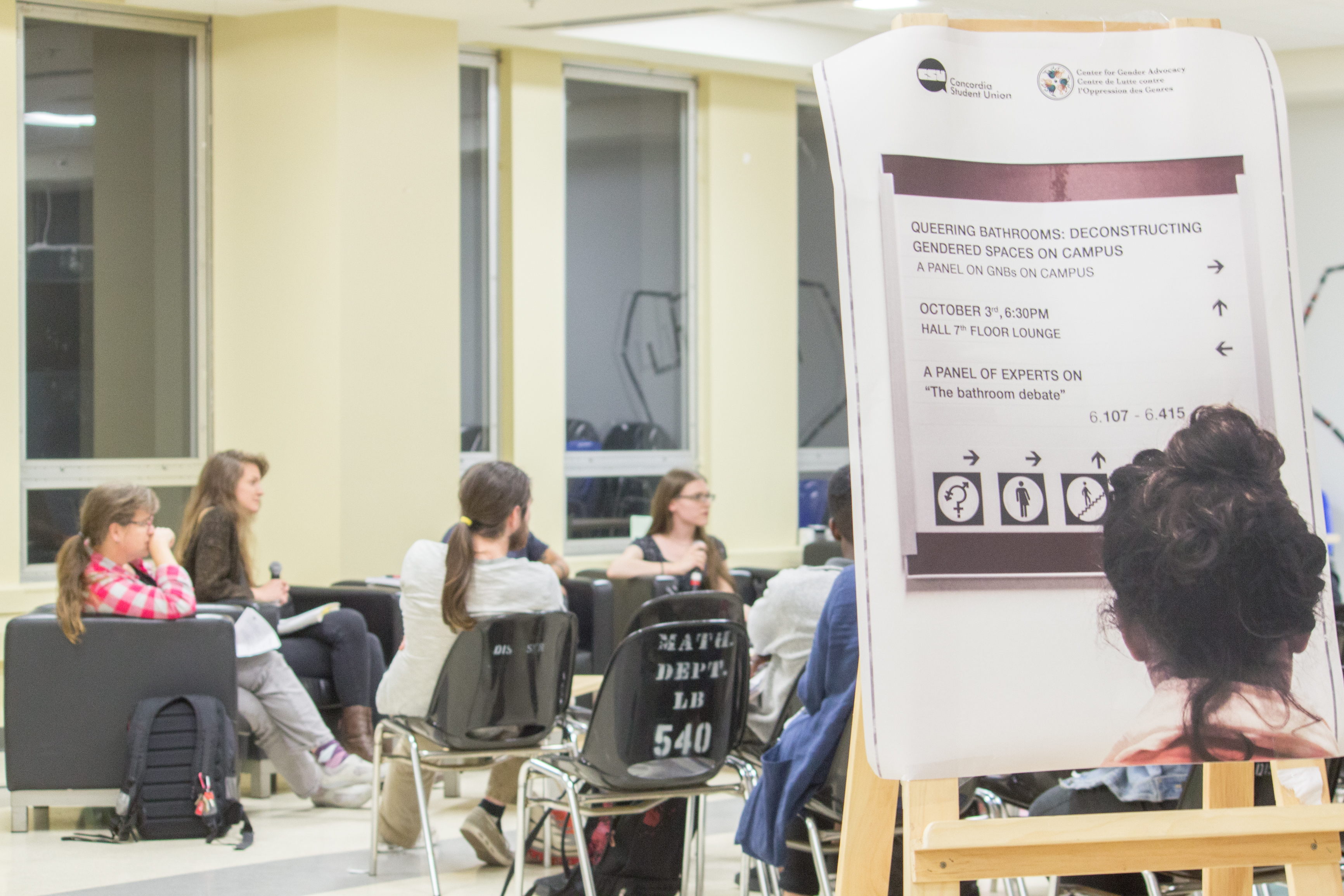Panelists discuss health complications that have arised from trans* people avoiding bathrooms
The Concordia Student Union (CSU) and Centre for Gender Advocacy (CGA) hosted “Queering Bathrooms: Deconstructing Gendered Spaces,” a panel discussion exploring the issue of gender-neutral washrooms and their role in creating inclusive, safe spaces on university campuses on Oct 3.
Moderated by Gabrielle Bouchard, the CGA’s peer support and trans advocacy coordinator, the nearly three-hour event featured a panel of three activists and experts on issues related to trans* advocacy and representation.
The panelists included York University PhD student Johanna Fraser-Carrier, whose MA research focused on gender accessible washrooms in Canadian universities; Julien Rose Johnson, an activist and women’s studies major with firsthand experience advocating for accessible bathrooms; and Valerie Jeffcott, an activist and former chairperson of Dawson College’s gender advocacy centre, The Hive Centre.
The panel discussed a range of issues surrounding the debate of gender-neutral washrooms including safety, accessibility and misconceptions.
The panel’s focus was on the impact of gender accessible washrooms for trans* and non-binary students on university campuses. While safety and representation were key arguments in favour of gender accessible restrooms, the panelists also discussed the negative health effects created by gendered washrooms.
Johnson shared a statistic from a Williams Institute study conducted by Jody L. Herman, which stated that 54 per cent of trans* and non-binary participants experienced health issues, including kidney infections, dehydration and urinary tract infections, as a result of trying to avoid gendered public washrooms.
While each panelist is an expert on gender and trans* issues in their own right, personal experiences were also brought to the table. Johnson shared the story of their two-year-long fight with Dawson College’s administration to ensure gender accessible washrooms for the institution’s thousands of students.
“The administration had zero understanding of what anything I was saying meant,” Johnson said. They even had to explain the concept of trans* people to the administration. “[It] was really not cool. I did not enjoy it.”
Ultimately, Johnson was successful, although Dawson’s gender-neutral washrooms were only implemented two months before their graduation.
The panelists also offered their perspectives on the best ways to implement gender accessible facilities.
Jeffcott pointed out that having gendered washrooms right beside gender-neutral ones still forces trans* and non-binary students to “other” themselves by exposing their discomfort with using gendered washrooms. “My preference would be a situation where there are multi-stalled washrooms and there are also private, individual washrooms,” Jeffcott said, to the agreement of the other panelists.
“The concept of options is a great idea,” Johnson added. “There are people at different levels of “out,” and they want to be able to navigate that as they please.”
Although she often uses women’s washrooms, Jeffcott said “while I was still pretending to be a boy, I definitely would have appreciated a gender-neutral washroom.”
Concordia University has taken steps to address this issue—according to the CGA’s website, the university now has over 100 gender-neutral washrooms across its two campuses.
However, the panel offered input on ways gender neutral washrooms can still strive to improve in terms of accessibility, iconography and social acceptance.
“Right now, we are not going to end violence against women or trans* people… but we can still take steps to litigate these issues,” said Fraser-Carrier.




